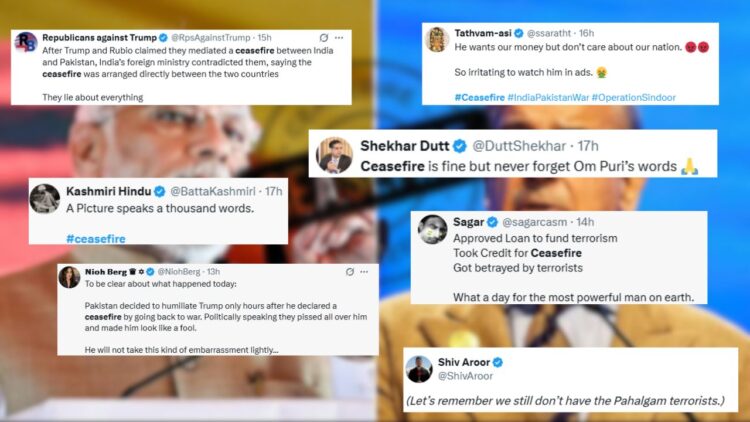KEY POINTS
- Global leaders, including Donald Trump and EU officials, welcomed the truce, while India denied any external mediation.
- Many Indian citizens criticized the ceasefire online, calling it premature and influenced by U.S. pressure, demanding stronger retaliation.
- Social media erupted with mixed reactions, with users questioning the ceasefire’s effectiveness and expressing distrust toward Pakistan’s intentions.
In a surprising move, India announced a ceasefire agreement with Pakistan, effectively bringing an end to several days of intense military confrontations that followed the deadly terrorist attack in Pahalgam on April 22. The announcement has ignited a storm of reactions across social media, with a significant section of the public voicing disappointment and frustration, arguing that India should have pursued its military offensive further to achieve what they called a definitive “victory” over Pakistan.
Mixed Reactions on Social Media
Social media platforms were quickly inundated with a wide range of opinions. While some users welcomed the de-escalation, highlighting the importance of peace and the dangers of a full-scale war, many others considered the ceasefire to be a premature and unsatisfactory compromise. Criticism also emerged around the perceived involvement of the United States in brokering the truce, with users questioning the necessity of foreign mediation in bilateral matters between India and Pakistan.
Global Leaders React
The ceasefire drew reactions from major global leaders, most notably from former U.S. President Donald Trump. Taking to his platform, Truth Social, Trump made an unofficial announcement even before Indian and Pakistani officials confirmed the agreement. He wrote, “After a long night of talks mediated by the United States, I am pleased to announce that India and Pakistan have agreed to a FULL AND IMMEDIATE CEASEFIRE. Congratulations to both countries on using common sense and great intelligence. Thank you for your attention to this matter!” This post sparked immediate attention and controversy, particularly as Indian authorities later denied any foreign mediation.

U.S. Secretary of State Marco Rubio echoed Trump’s sentiment but took a more diplomatic tone. He stated, “I am pleased to announce the Governments of India and Pakistan have agreed to an immediate ceasefire and to start talks on a broad set of issues at a neutral site. We commend Prime Ministers Modi and Sharif on their wisdom, prudence, and statesmanship in choosing the path of peace.”
Over the past 48 hours, @VP Vance and I have engaged with senior Indian and Pakistani officials, including Prime Ministers Narendra Modi and Shehbaz Sharif, External Affairs Minister Subrahmanyam Jaishankar, Chief of Army Staff Asim Munir, and National Security Advisors Ajit…
— Secretary Marco Rubio (@SecRubio) May 10, 2025
From Europe, EU Foreign Policy Chief Kaja Kallas issued her own statement, “The announced ceasefire between India and Pakistan is a vital step toward de-escalation. All efforts must be made to ensure it is respected. The EU remains committed to peace, stability, and counter-terrorism in the region.”
Just spoke again with @DrSJaishankar and @MIshaqDar50.
The announced ceasefire between India and Pakistan is a vital step toward de-escalation. All efforts must be made to ensure it is respected.
The EU remains committed to peace, stability, and counter-terrorism in the region.
— Kaja Kallas (@kajakallas) May 10, 2025
Saudi Arabia’s Ministry of Foreign Affairs also welcomed the development and said, “The Foreign Ministry welcomes the ceasefire agreement between Pakistan and India, optimistic that it will restore security and peace in the region. The Kingdom commends both parties for prioritising wisdom and self-restraint and reaffirms its support for resolving disputes through dialogue and peaceful means.”
#Statement | The Foreign Ministry welcomes the ceasefire agreement between the Islamic Republic of #Pakistan and the Republic of #India, optimistic that it will restore security and peace in the region. pic.twitter.com/f6AOefL9d1
— Foreign Ministry 🇸🇦 (@KSAmofaEN) May 10, 2025
Public Discontent and Outrage
While world leaders expressed satisfaction with the truce, the mood on Indian social media was notably different. Many users felt betrayed, accusing the Indian government of capitulating under U.S. pressure.
A user named Rudra Raju tweeted, “We Indians did not expect this from you… to bow down due to pressure from the US… We wanted you to capture Pakistan and we could have taught them a good lesson.”
Another user, Vinod Koul, commented, “It was a mistake. Don’t trust them. Demolish them.”
On Facebook, Sanjeev Ranjan posed a series of pointed questions in response to the ceasefire. “Will this ceasefire ensure no more incursions from Pakistan’s side? Will governments ensure that innocents will not get killed? Ensure Pahalgam doesn’t get repeated? Can people who have lost their loved ones get over their deep wounds? Will there be security for tourists or is it for politicians only? If the answer is yes, then peace is worth it…!!” He posted.
Celebrity Voices: Raveena Tandon Speaks Out
Bollywood actress Raveena Tandon, while supporting the ceasefire, made her reservations clear through a strongly worded post and mentioned, “If this is true, then it’s a welcome decision. #ceasefire. But make no mistake, the day India bleeds again #statesponsoredterrorism it will be an act of war, and then there will be hell to pay. The #IMF had better keep track of where their money goes. The big powers may have sanctioned these loans to recover earlier debts or to fund more ammunition or whatever. But now and never should Bharat bleed again.”

In her caption, she added, “#ceasefire But few things are pretty clear. I will support my country in all the ways I can as a citizen. #mycountrymylife #bharatforever This has shown us who our friends are and who aren’t. My country’s enemy is mine. The world must act against terrorism and fast.”
Dispute Over Mediation Claims
Despite Donald Trump’s assertion that the ceasefire resulted from U.S.-mediated negotiations, Indian officials flatly denied this claim. According to the Indian government, the ceasefire was the outcome of direct, bilateral discussions between New Delhi and Islamabad, conducted without any external interference or facilitation.

















Comments